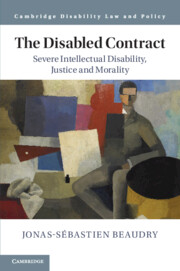Book contents
- The Disabled Contract
- Cambridge Disability Law and Policy Series
- The Disabled Contract
- Copyright page
- Dedication
- Epigraph
- Contents
- Foreword
- Acknowledgments
- 1 Severe Intellectual Disability and the Social Contract
- 2 Inclusive Contractarianism
- 3 The Capacity to Trust as a Contractual Basis for Robust Moral Status
- 4 People with Severe Intellectual Disabilities as Active Citizens
- 5 People with Severe Intellectual Disabilities as Passive Citizens
- 6 Other-Regarding Concern and Exploitation
- 7 Beyond Contractual Relations
- Bibliography
- Index
2 - Inclusive Contractarianism
Persons with Severe Intellectual Disabilities within a Society of Self-Interested Contractors
Published online by Cambridge University Press: 15 March 2021
- The Disabled Contract
- Cambridge Disability Law and Policy Series
- The Disabled Contract
- Copyright page
- Dedication
- Epigraph
- Contents
- Foreword
- Acknowledgments
- 1 Severe Intellectual Disability and the Social Contract
- 2 Inclusive Contractarianism
- 3 The Capacity to Trust as a Contractual Basis for Robust Moral Status
- 4 People with Severe Intellectual Disabilities as Active Citizens
- 5 People with Severe Intellectual Disabilities as Passive Citizens
- 6 Other-Regarding Concern and Exploitation
- 7 Beyond Contractual Relations
- Bibliography
- Index
Summary
This chapter focuses on contractarian arguments to bring PSID into our political community. The most obvious argument is by showing that it is advantageous for other members of the community to include them in their ‘cooperative venture.’ This inclusion can be done either directly – by thinking of PSID’s social input differently – or indirectly – by showing that their integration into our community indirectly benefits us, even if they were mostly passive beneficiaries. This first kind of justification, I argue, seems empirically dubious and the latter offers a problematically derivative or contingent status to PSID. I conclude that taking a collectivist, multipartite stance on reciprocal relations to elaborate a kind of rule-contractarianism remains a promising avenue. However, for this argument to be convincing, the contingency objection ought to be met by rendering the inclusion of PSID as less of an opportunistic happenstance and more of a necessity based on their traits and on the nature of the contribution they can provide.
- Type
- Chapter
- Information
- The Disabled ContractSevere Intellectual Disability, Justice and Morality, pp. 53 - 81Publisher: Cambridge University PressPrint publication year: 2021

